
Puzzles often feature on lists of gifts for dementia patients, including those with Alzheimer’s disease. But, what makes puzzles for Alzheimer’s patients so powerful and how can you take advantage of them?
Well, first of all, we’re not talking about large puzzles with 1,000, 2,000, or even 10,000 pieces. Nor are we talking about complicated puzzles with abstract images or repeating patterns.
Puzzles for people with Alzheimer’s disease tend to be simpler. They need to be. Many have 100 pieces or even less, depending on the individual. Yet, despite their apparent simplicity, such puzzles can be powerful.
They offer many benefits for the senior, while also helping family members around them.
The Benefits of Puzzles for Alzheimer’s Patients

Puzzles Are Grounding
Alzheimer’s disease can be scary and overwhelming for people suffering from it. Many also deal with considerable anxiety and agitation.
Puzzles for Alzheimer’s patients can be great in these situations – as they give the senior something to focus on, something that has nothing to do with how they feel.
More than that, puzzles are problems to solve. Doing so can be incredibly rewarding, creating the sense that some aspects of life are still in the senior’s control.
Puzzles Have a Meditative Quality
Puzzles also function a little like meditation, allowing people to slow down and become much more relaxed.
These effects don’t just feel good, they’re also highly relevant for health, helping to lower blood pressure and stress hormone levels.
The calming effect is also helpful for everyone in the household. Caregivers may find that they have the chance to relax themselves or get some much needed tasks completed.
They Keep The Hands Busy
Puzzles also give seniors something to do with their hands. Not only is this grounding, but keeping the hands busy helps with dexterity as well.
This is the same reason that fidget toys and fidget blankets work well in the late stages of dementia.
Can Improve Cognition
Working on solving a problem can also help to keep seniors engaged and thinking, an exercise that can even improve short-term memory and brain function.
Puzzles aren’t going to cure Alzheimer’s disease, of course, nor will they stop the condition from progressing. However, the short-term benefits are still worthwhile for the senior and their family.
Offer a Way to Connect Socially
While puzzles are normally a solo activity, they can have a social element as well. You might be able to work on a puzzle with your aging parent or talk to them about the picture.
Puzzles can even turn into a family night activity.
However, you need to be sure that the puzzle chosen matches the senior’s ability, otherwise they’re likely to be quickly frustrated.
Can Improve Mood
Puzzles can also help to improve the senior’s mood, partly because there’s a slight ‘feel good’ boost whenever they get a piece in the right place.
The mental stimulation is useful for mood improvement as well. This can potentially jolt the senior out of any low mood they’re experiencing.
Finishing a puzzle can also come with a feeling of accomplishment, which is incredibly valuable. The trick here is to make sure the Alzheimer’s patient is working on a puzzle that they can complete – ideally one they can complete alone.
How to Match Puzzles to Their Needs
When choosing puzzles for Alzheimer’s patients, it’s important to match the puzzle to the senior’s needs and ability.
If the puzzle is too difficult, then they’re likely to become frustrated and anxious. Choosing a puzzle that’s too simple is frustrating as well.
For example, some seniors at the very early stages of dementia may be able to complete regular puzzles without apparent difficulty. As their condition progresses, puzzles may get harder to complete, so it may be necessary to gradually shift to simpler ones.
Watch How They Do With Puzzles
The simplest way to match puzzles to a senior’s needs is through trial and error. If the senior is working on a puzzle, pay attention to whether they’re enjoying themselves or seem frustrated.
You can also look at whether they complete the puzzle or not.
Some seniors may not tell you that they’re having difficulty. They might instead leave the puzzle unfinished or act like they are bored with it.
Such patterns suggest that they need something simpler.
Step Down Slowly
If someone can’t quite complete a 700 piece puzzle, you don’t immediately want to step them down to a 13 piece dementia puzzle. Doing so isn’t likely to go down well.
It’s much better to make the changes gradually.
This might mean you go from 700 to 500 pieces or that you look for a puzzle with more obvious color and piece variations.
Shifting gradually like this is kinder to the senior and also makes it easier to find the right puzzle for their current level.
Ask Their Opinion
You may also be able to ask the senior about their favorite puzzles. This should give you a sense of the difficultly level that they’re currently enjoying and help you to find other similar puzzles.
The Best Puzzles to Choose
Relish Puzzles
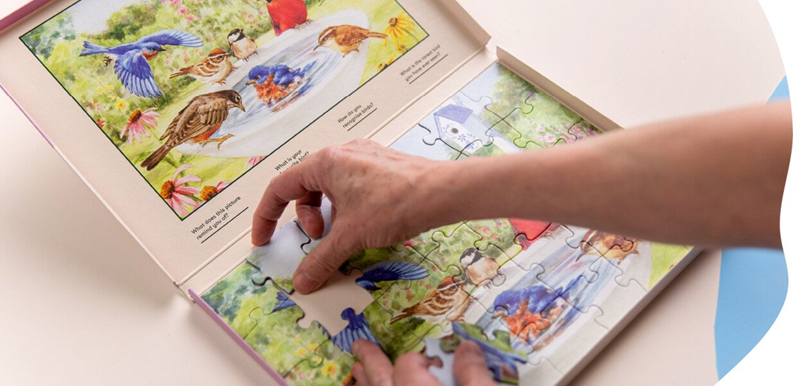
Relish is a fantastic brand, as the company specifically focuses on products for dementia patients. As a result, their products are carefully designed and they think about how needs change as dementia progresses.
Their Amazon store provides puzzles ranging from 13 to 100 pieces. The puzzles tend to have nostalgic designs and vibrant contrasting colors that make them a joy for dementia patients.
There are backing boards too and an image to guide the senior, reducing the chance that they’ll be overwhelmed.
The 13 piece puzzles are particularly interesting, as Relish focuses on using large pieces that are all shaped differently and are easy to handle.
Another interesting feature is that the boxes avoid the word dementia entirely. This could be helpful for sensitive seniors.
Puzzles Based on the Past
Another style of puzzles for Alzheimer’s patients is ones that are based on the past. Relish puzzles do this to a degree, as some of the images are nostalgic and will be immediately familiar.
However, you can take this one step further and get custom puzzles made based on an image. Doing so allows you to choose images that mean something to the senior.
Such puzzles can help the senior to connect with comforting memories. They may also act as a talking point, giving you the chance to reminisce with them about events in the past or what the picture means to them.
Any custom puzzle should meet the needs of a dementia patient. This includes having large easy-to-handle pieces and not being overly difficult.
Family Puzzles
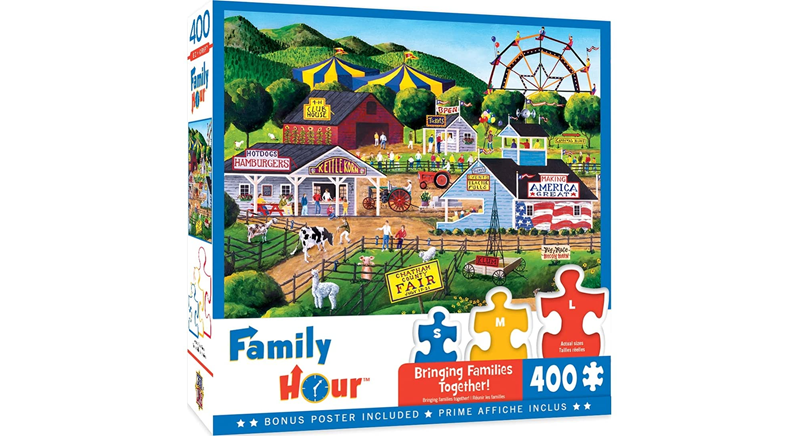
Puzzles that are designed for families can be fantastic.
These often have vibrant images and multiple piece sizes – allowing people of different skill levels to work together on the same puzzle.
The image above is one example of the style. You can find the puzzle itself here.
Sequenced Puzzles
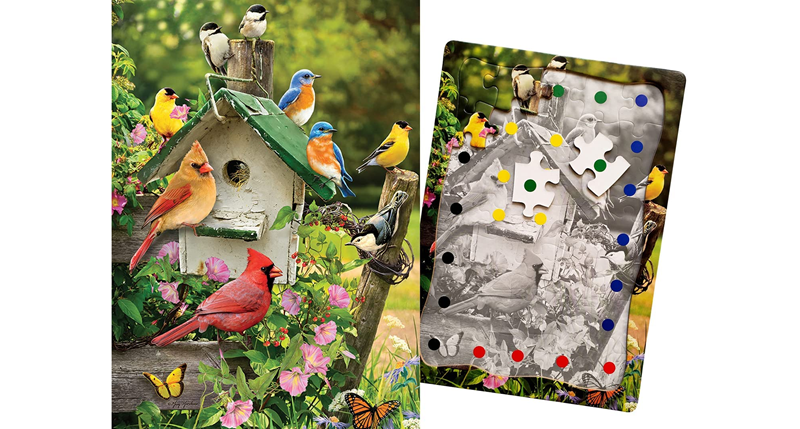
Sequenced puzzles (like this one) are another way to make puzzles a little easier for seniors.
They often have a version of the image on the backing board, so seniors just need to match the puzzle pieces to the image. Pieces may also be color coded, making it still easier to match them.
Many such puzzles also include instructions about how family members or caregivers can adapt the puzzle to match the senior’s needs. This way you can be sure they have an enjoyable experience with just the right amount of difficulty.
Keeping Busy Puzzles
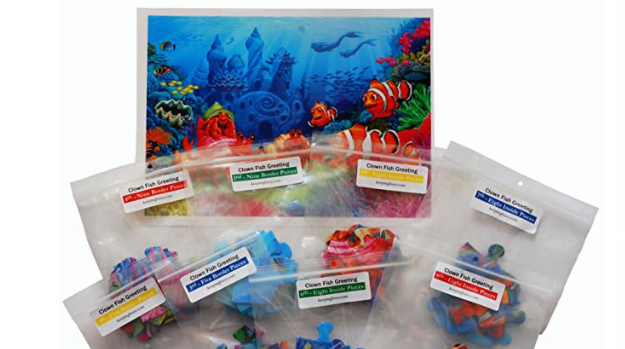
Keeping Busy is another company that specifically focuses on dementia puzzles. They have three styles: 60 piece sequenced puzzles, 35 piece sequenced puzzles, and 24 piece sequenced coloring puzzles.
The 24 pieces are interesting because the images are outlines and need to be colored in when the puzzle is completed. The style makes the puzzle more challenging, but does provide an additional activity of coloring in after the puzzle has been completed.
Wooden Tangram Puzzles
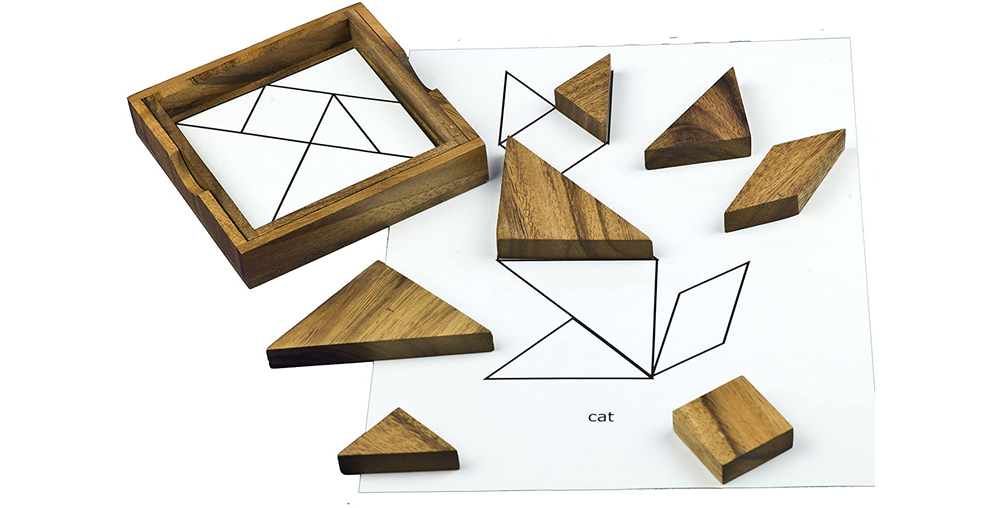
Wooden tangram puzzles are a different style to consider. Ones designed for dementia patients tend to be simple and have clear outlines for where each piece should go.
The puzzle itself simply involves matching the shapes. This style may be too simple for some dementia patients, yet for others it could be perfect.
The size and shape of the individual puzzle pieces is attractive too, as they should feel good in the senior’s hand.
You can often adapt the puzzle as well. For example, the version linked above has a lined and unlined side for each image. The unlined one is harder, but you can add lines to match the senior’s needs – then erase them later as the senior gets better at the puzzle.
Puzzle-Like Games to Consider
While we’ve mostly been talking about jigsaw puzzles, other types of puzzles and puzzle-like games can be useful for dementia patients as well. Again, the goal is to match the level of difficulty to the senior’s needs.
Most of the benefits are the same as with puzzles for Alzheimer’s patients. In particular, games and activities can help calm seniors, giving them something to do with their hands and even a sense of control.
Relish has a few games to choose from, including Musical Bingo, Snap, and a Maze Marble Game.
There are many other products out there too. Some are designed for seniors to use on their own, while others are an activity that you might do with them.
While some kid’s games will work well for people with dementia, it’s generally best to look for ones designed for dementia patients. These are more likely to reflect adult themes and should be less childish.
Feeling Overwhelmed?
Check out our Caregiving Consulting service for personalized support and guidance.


Leave a Reply